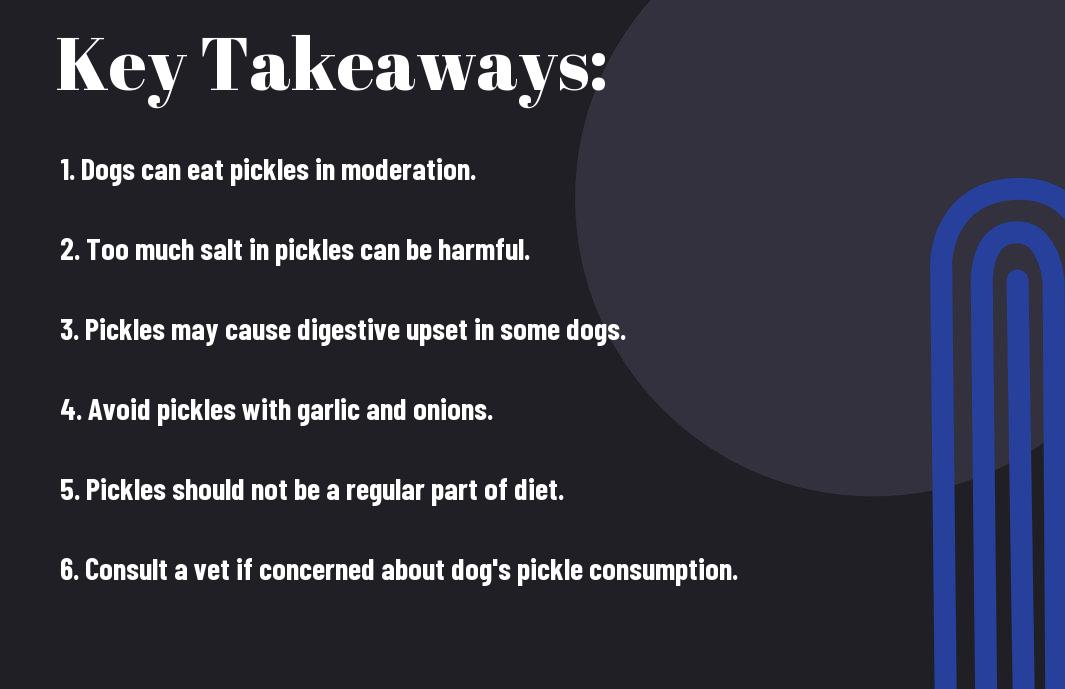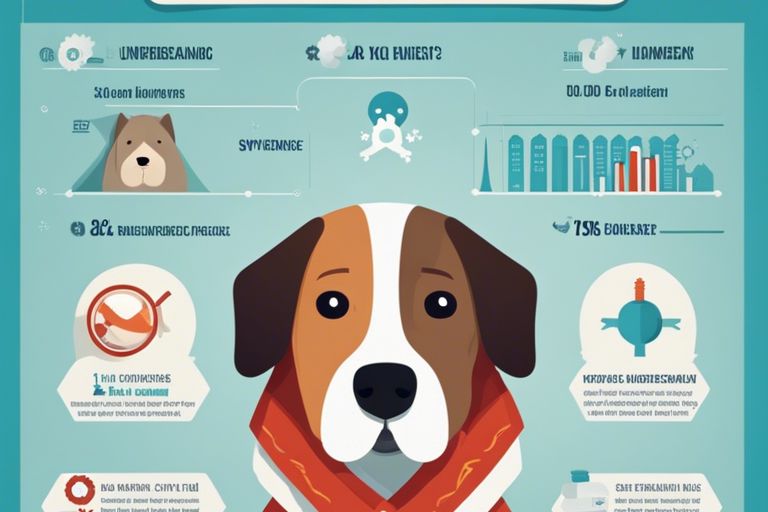Rarely do I encounter a pet owner who hasn’t pondered this question at some point. So, can dogs eat pickles? The quick and simple answer is yes, but it’s accompanied by an important caveat – moderation is key. Pickles themselves are not toxic to dogs, but the high salt content in pickles can pose serious health risks if consumed in large amounts. Excessive salt intake can lead to dehydration and electrolyte imbalances in dogs, causing symptoms ranging from vomiting and diarrhea to seizures and even death. If you’re considering sharing pickles with your pup, it’s essential to understand the potential risks and benefits. For further reading, you can check this Can Dogs Eat Pickles? article for detailed guidelines and recommendations on feeding pickles to your furry friend.
Key Takeaways:
- Dogs can technically eat pickles, but it is not recommended. While pickles themselves are not toxic to dogs, the high sodium content and potential for added flavorings like garlic and onions can be harmful to your pet.
- High levels of sodium in pickles can lead to health issues in dogs. Consuming too much salt can cause dehydration, kidney damage, and even sodium ion poisoning in dogs.
- Garlic and onions, commonly found in pickles, are toxic to dogs. These ingredients can cause damage to a dog’s red blood cells, leading to anemia and other serious health issues.
- If you do decide to give your dog a small amount of pickle, make sure it is plain and in moderation. It’s best to avoid giving your dog pickles altogether, but if you do, make sure they are plain and given in small amounts to minimize potential harm.
- Always consult with your veterinarian before introducing new foods into your dog’s diet. Every dog’s dietary needs and tolerances are different, so it’s important to seek professional advice before giving your dog any non-traditional treats.

Can a Dog Eat a Pickle?
To answer this question, it’s important to consider the ingredients in a pickle. While pickles are not toxic to dogs, they should be given in moderation. The main concern is the high salt content, which can be harmful to your dog’s health if consumed in large quantities. Additionally, pickles often contain ingredients such as garlic and onions, which are toxic to dogs. So, while a small piece of pickle once in a while may not be harmful, it’s best to avoid giving pickles to your furry friend on a regular basis.
Pet Nutrition
When it comes to your dog’s diet, it’s important to focus on providing balanced nutrition. While a pickle may not necessarily pose a serious threat to your dog’s health, it’s essential to ensure that their main diet consists of high-quality, dog-friendly food. This means feeding them a balanced diet that includes protein, healthy fats, vitamins, and minerals. Adding pickles to their diet can disrupt this balance and lead to health issues. Always consult with your veterinarian to ensure that you are providing the best nutrition for your dog.
Canine Enrichment
Canine enrichment is an important aspect of your dog’s well-being. While it’s tempting to share your snacks with your furry friend, it’s important to provide them with appropriate enrichment activities and treats. Offering your dog a variety of safe and healthy treats can keep them mentally stimulated and prevent them from developing unhealthy eating habits. Instead of pickles, consider offering your dog treats specifically designed for them, such as dog-safe fruits and vegetables, or specialized dog treats.
Is It Safe or Harmful?
Some people may wonder whether dogs can safely eat pickles. The answer is not straightforward, as there are several factors to consider. While pickles themselves may not be toxic to dogs, there are certain aspects of pickles that may not be suitable for their digestive systems.
Pet Safety
When it comes to feeding your dog pickles, it is important to consider the safety aspect. High sodium content in pickles can be harmful to your dog’s health. Excessive salt intake can lead to dehydration and kidney damage in dogs. Additionally, pickles often contain spices and flavorings that may not agree with your dog’s digestive system. It is always best to consult with your veterinarian before feeding any unfamiliar foods to your furry friend.
Toxicology
From a toxicology standpoint, pickles themselves are not inherently toxic to dogs. However, the ingredients and additives in pickles could potentially be harmful. For example, onions and garlic, which are sometimes used as flavorings in pickles, are known to be toxic to dogs. It is essential to carefully read the ingredient list and avoid feeding pickles that contain these harmful ingredients to your dog.
Implications and Remedies
Your dog’s health is of paramount importance, and it is crucial to be aware of the potential implications of allowing your dog to eat pickles. While pickles are not inherently toxic to dogs, they can pose some risks and have certain implications for your dog’s health. It is important to be proactive in finding remedies to mitigate any potential harm that could arise from allowing your dog to consume pickles.
Veterinarian Check-ups
Regular check-ups with a veterinarian are essential for maintaining your dog’s overall health and well-being. If you suspect that your dog has consumed a significant amount of pickles or is exhibiting any unusual symptoms after eating pickles, it is crucial to seek professional veterinary care immediately. Your veterinarian will be able to assess your dog’s condition and provide appropriate treatment if necessary, ensuring that any potential health implications are addressed promptly.
Neutering
Neutering your dog can have significant implications for their behavior and overall health. It is worth noting that unneutered male dogs can be more prone to territorial aggression, which may potentially become exacerbated if the dog’s digestive system is upset by consuming pickles. Neutering your dog can help reduce the risk of certain health issues and behavioral problems, ultimately contributing to their overall well-being. Consult with your veterinarian to determine the best course of action for your dog’s specific needs.

Can a Dog Eat a Pickle – Is It Safe or Harmful?
With this in mind, it is best to avoid feeding your dog pickles on a regular basis. While an occasional small amount of pickle may not harm your dog, it is still not the best choice for them. The high salt content and potentially harmful ingredients in pickles can cause digestive issues and lead to other health problems for your furry friend. It is important to consult with your veterinarian before introducing any new foods into your dog’s diet to ensure their safety and well-being.
Can a Dog Eat a Pickle – Is It Safe or Harmful?
Q: Can I give my dog a pickle as a treat?
A: While pickles are not toxic to dogs, they are not recommended as a treat due to their high salt and acid content, which can be harmful to your dog’s health.
Q: What are the potential risks of giving my dog a pickle?
A: The high salt content in pickles can lead to excessive thirst, urination, and potentially sodium ion poisoning in dogs. The acidic nature of pickles can also cause digestive upset and discomfort for your dog.
Q: Can a small amount of pickle be safe for my dog to eat?
A: Even a small amount of pickle can potentially lead to health issues for your dog. It is best to avoid giving pickles to your dog altogether.
Q: What should I do if my dog accidentally eats a pickle?
A: If your dog accidentally consumes a small amount of pickle, monitor them for any signs of distress, such as vomiting, diarrhea, or excessive thirst. If you notice any concerning symptoms, contact your veterinarian immediately.
Q: Are there any alternatives to pickles as treats for my dog?
A: Yes, there are plenty of safe and healthy alternatives to pickles, such as carrots, apple slices, or plain, unsalted cooked meats. These treats provide a much healthier option for your dog and can be enjoyed in moderation.








Leave a comment